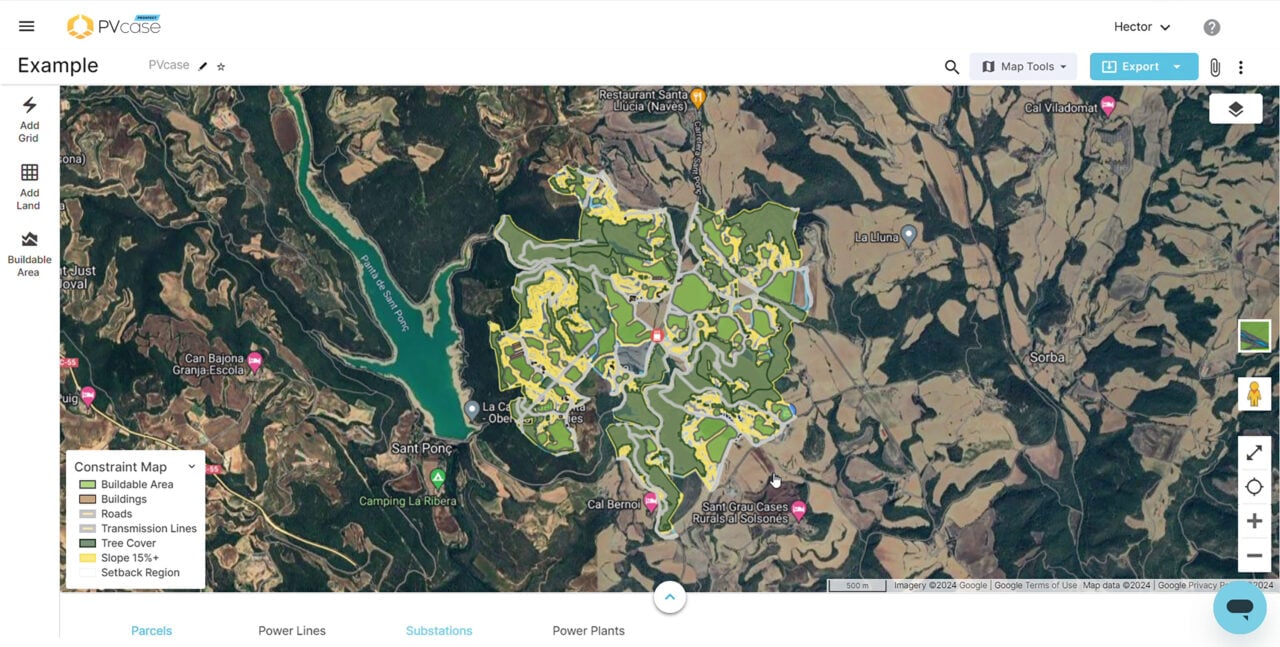How does PVcase mitigate data risk in solar energy development?
November 6, 2024

What is data risk?
Data risk in solar energy projects means data quality degradation due to errors, inconsistencies, or inaccuracies as data moves through various stages of a project lifecycle. This risk emerges from the necessity of transferring large amounts of data across different systems, tools, and teams involved in solar project development—from land acquisition and permitting to design, construction, and maintenance.
Since solar projects often involve multiple companies, suppliers, and consultants who each use different formats and platforms, data discrepancies are common. Factors like outdated formats, manual data entry errors, mismatched units of measurement, and differing data structures can compromise data integrity.
Moreover, development teams often work in silos, infrequently exchanging data sets. For instance, while the team in the west might have access to nationwide flood data, the team in the east may not yet have received this information. Instead of accessing it through a unified platform, they share data manually, or even worse, they pull from various sources, which leads to inconsistencies and confusion.
Challenged caused by data risk
As solar energy projects become more complex and ambitious, addressing data risk becomes a critical component in achieving successful, profitable, and fast project outcomes. Therefore, poor data quality can have significant consequences for project success and the workflow of solar developers, effecting the accuracy of site designs, prolonging project timelines, and increasing overall costs.
Inaccurate data
One of the primary challenges associated with data risk is the loss of data accuracy as information is shared and transformed throughout the project. For example, during the design phase, environmental data or land measurement discrepancies can lead to incorrect assessments of buildable areas. Such inaccuracies may necessitate costly redesigns or even jeopardise the project’s feasibility.
Data inconsistencies can also have significant impacts on financial forecasting and yield estimation. When data used for predicting a project’s energy output is flawed, the project may underperform, leading to missed financial targets and damaged stakeholder trust. Given the significant investments involved in solar projects, even small inaccuracies can have substantial economic consequences.
Increased time and resource consumption
Data discrepancies can increase development time and resource consumption as developers and engineers must dedicate additional efforts to validating and correcting data. Manual data verification processes can slow down projects, especially when data is transferred from one platform to another without automated checks for consistency. This can lead to extended project timelines, missed deadlines, and higher costs.
Financial and operational impact
The financial implications of data risk are significant, affecting the costs associated with project delays and the long-term profitability of solar energy investments. Data errors or inconsistencies can compromise the quality of site designs, causing projects to underperform or even fail to meet energy production targets. Such outcomes can negatively affect financing, reduce investor confidence, and limit future development opportunities.
Additionally, operational issues arise when data-related problems extend into the construction and maintenance phases. For instance, flawed site plans may require costly changes during construction, resulting in increased material and labor costs.
During the maintenance phase, poor data quality can hinder effective monitoring and troubleshooting, reducing the efficiency of operations and potentially shortening the lifespan of the solar installation.
Data risk mitigation with PVcase
The good news is that solar developers can now get ahead of the curve by tackling data risks before they become issues. PVcase offers a comprehensive product suite for every stage of project development—from site selection to ground and roof mount design and yield estimation. PVcase’s tools streamline solar development and minimise data risks throughout the project lifecycle by successfully addressing the root causes of data degradation.
PVcase Prospect: streamlined data integration and site selection
PVcase Prospect facilitates automated site analysis and selection using a combination of out-of-the-box, premium, and user-imported data sets. Thanks to this capability, developers can now quickly identify optimal sites. Moreover, the tool’s ability to export parcel data and share project details via URL ensures seamless communication between stakeholders, reducing the potential for data misinterpretation or loss during handoffs.
Data transfer between project phases
When transitioning from site selection (PVcase Prospect) to detailed design (PVcase Ground Mount), PVcase ensures that no crucial data is lost. For example, exclusion zones, buildable areas, and other key site details identified during the prospecting phase are preserved when imported into the Ground Mount tool. This consistency is vital for maintaining data integrity, avoiding costly redesigns, and minimising the likelihood of human error.
Data export and integration
PVcase’s capabilities extend beyond design and into project data management. The ability to export detailed project files with all relevant datasets allows developers to maintain a clear and accurate record of project details. This exported data can be easily integrated into other platforms used for construction, permitting, or maintenance, ensuring a continuous flow of reliable information throughout the project lifecycle.
Tackle data risks before they appear in your workflow
Discover strategies to bypass data risks and challenges before they lead to significant setbacks—join our insightful webinar, “The hidden threat to solar projects: understanding and eliminating data risk,” where you’ll dive into the complexities of data risk and learn how PVcase can help you effectively mitigate data challenges to revolutionise solar development. During the session, you’ll dive into:
- An in-depth explanation of data risk and its implications for solar projects.
- How data risk jeopardises your company’s success and slows down the renewable industry.
- How PVcase addresses data risk across the solar development.
- Practical strategies for reducing data risk through.
- PVcase product suite and how it addresses the specific challenges posed by data risk.
PV Tech is hosting a webinar with PVCase on Wednesday, November 13th 2024 – 4:00 PM (GMT). The webinar will provide an understanding of data risk for renewable energy projects and the challenges it poses, providing you with practical strategies and best practices to ensure data accuracy and reliability throughout your entire project. Register here.
Search
RECENT PRESS RELEASES
Related Post




